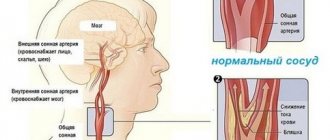Adequate rest is one of the essential components of a person’s physical and mental health. Even short-term violations in this area can lead to unpleasant consequences, and chronic conditions pose a serious danger. Sleep disorders can develop for many reasons, but most often insomnia occurs due to nervousness. Help in such a situation requires professional and comprehensive help, but the patient himself is able to do a lot to improve the condition. Eliminating the factors that cause insomnia is usually enough to achieve positive dynamics.
Problems with falling asleep most often arise from nervousness.
Types of insomnia in the development of neurosis
There are several options for classifying sleep disorders. Insomnia can be situational, short-term or chronic. The first type of pathology occurs against the background of acute stress. The clinical picture usually disappears on its own within a week and does not require specialized treatment. The second type of nervous insomnia is usually provoked by psychological trauma, its symptoms persist for up to a month.
Chronic insomnia is diagnosed when sleep problems persist for more than a month.
This is a serious pathology that becomes a source of physical and psychological problems.
Nervous insomnia occurs according to one of the scenarios or includes several characteristics at once:
- difficulty falling asleep - sleep does not occur for 20 minutes or more after the person goes to bed;
- superficial sleep - night's rest is more like a nap, during which the patient is often visited by very realistic visions or nightmares;
- frequent awakenings at night - the sleeper reacts sensitively to any irritants, which is why he regularly wakes up and then cannot fall asleep for a long time;
- early awakening - the patient wakes up early, after which he is unable to fall asleep, despite insufficient hours of rest.
When stressed, a person cannot fall asleep for 20 minutes or more after going to bed.
Insomnia caused by nerves most often has a combined form, so complex treatment is required. Timely initiation of therapy allows you to quickly achieve the desired result without negative consequences for the body. Refusal of specialized therapy threatens the development of somatic diseases and serious mental disorders.
Diagnosis of insomnia
Insomnia is not only a complete lack of sleep, but also other disturbances in the course of this natural process. Thus, this neurosis is characterized by the following symptoms:
- prolonged falling asleep;
- waking up in the middle of the night;
- early awakening without a feeling of rest after sleep;
- constant fatigue, depression and drowsiness during the day;
- unconditional aggression, irritability;
- difficulty concentrating;
- memory problems;
- frequent headaches, poor health;
- problems with the functioning of the gastrointestinal tract.
Insomnia due to stress can manifest itself differently in each person. It is also necessary to take into account the fact that everyone has their own sleep schedule (6-7 hours is enough for some, and 10 is not enough for others). The diagnosis is made if there have been some changes to your previous regimen. For example, the usual eight-hour rest is no longer enough, and you feel tired and sleepy throughout the day.
There is a lot of literature about what to do if you have symptoms of insomnia. The main thing is to find the true cause of such an illness. If sleep disturbance occurs due to stress, you need to first of all pay attention to this factor.
Symptoms and causes of insomnia in neurosis
Doctors name dozens of factors that can provoke insomnia, but neurosis remains the most common. This condition is characterized by disturbances in the functioning of the central nervous system, which in most cases are reversible. Against the background of such a disorder, a person begins to react too violently to factors of a psychotraumatic nature.
The brain, overloaded with constant worries, loses the ability to switch off when resting. He continues to actively process information, distill the same thoughts or memories. The patient becomes fixated on plans, problems, gloomy prospects, which completely deprives him of sleep or reduces the depth of the process.
At the initial stage of the pathology, the patient experiences rapid fatigue, irritability, and increased emotional sensitivity. The patient cannot relax, the process of passive rest is disrupted. If you identify the problem during this period, take into account the doctor’s advice and eliminate the causes of sleep disturbance, you can count on a quick normalization of the patient’s condition.
Seeing a doctor early will help quickly resolve the problem.
Stress relief
Mental health is a fairly important component of overall well-being. It is believed that it is emotional experiences that provoke the development of many diseases. Stress is a serious illness that requires special attention on your part. Since there can be so many reasons for its occurrence, it can be difficult to figure it out on your own. You may need specialist help.
It is believed that our descendants experienced stress only in case of danger to life. At this moment, a large amount of adrenaline was released in the body, and they urgently needed to make a decision: flight or fight. A similar scheme can be successfully used to restore mental balance. To do this, just include regular physical activity. In this case, all released substances (excess adrenaline, hormones) will simply be directed in the right direction.
If the appearance of neuroses was influenced by your work schedule or family problems, you should pay attention to these aspects. Perhaps your condition will be normalized by such simple actions as refusing to work overtime, a little rest alone or, conversely, in the company of friends. Don't deprive yourself of the luxury of days off. Every person needs proper rest. Labor standards were invented for a reason!
Monitor your condition. If it does not improve for a long time, it is time to consult a psychologist or psychotherapist. The specialist will select the most suitable therapy for you, which may include one thing or several measures and techniques at once.
What can you do to overcome insomnia?
In situations where insomnia has appeared recently, has not yet become chronic, and is not accompanied by significant symptoms, you can try to cope with it on your own. An optimal daily routine, a healthy lifestyle, and increased attention to personal hygiene have a pronounced positive effect on the body.
Rules, the observance of which will relieve insomnia due to nervousness:
- waking up and going to bed should always be at the same time;
- you should refrain from resting during the day;
- after 15:00 it is recommended to stop drinking coffee, strong black tea, and alcoholic beverages;
- two hours before going to bed, you should stop loading your brain with reading, watching TV, or working with gadgets;
- It is better to spend the time before going to bed on passive rest, walking in the fresh air or doing simple physical exercises. The optimal load option is considered to be actions aimed at stretching the muscles;
- half an hour before going to bed, you can take a relaxing bath with aromatic oils or at least a warm shower;
- Breathing exercises, meditation, yoga, and acupressure provide a good relaxation effect.
Yoga can help you sleep.
In most cases, following these rules helps not only improve the quality of your night's rest, but also get rid of other manifestations of stress. You should not seek help from pharmaceutical drugs at the first signs of insomnia due to nervousness. First you need to try all of the listed approaches, and only after that start medicinal treatment of the problem. The use of any medications, including those on a natural basis, must be agreed with a doctor.
Symptoms
Insomnia can be diagnosed by its characteristic symptoms. These include:
- lack of sleep or prolonged falling asleep at night;
- frequent awakenings at night;
- lack of feeling of rest after sleep, early awakening;
- feeling restless, tired, depressed, anxious, irritable, or sleepy during the day;
- decreased concentration and memory;
- headaches, poor physical health;
- disruption of the functioning of the gastrointestinal tract.
Chronic lack of sleep as a result of insomnia can cause serious disorders in the body. It is much more effective to prevent their development than to fight them later.
What is medical care for a patient?
If a daily routine and a healthy lifestyle do not help with insomnia due to nerves, you need to consult a neurologist or psychotherapist. It is important to identify neurosis in time to prevent the problem from worsening, personality changes, and the development of mental disorders.
Experts advise not to delay this and seek advice if the problem persists for a week.
Medication help for insomnia from nervous experiences:
- sleeping pills - products that make it easier to fall asleep, increase the depth and duration of sleep;
- sedatives - products for relaxation, calming the nervous system, reducing its excitability;
- tranquilizers are the most effective sedative-type compounds that have a direct effect on the central nervous system.
Sedative tranquilizers have a direct effect on the nervous system.
An experienced doctor will treat nervous insomnia not only with medications. Typically, group or individual therapy is included in the treatment regimen. Additionally, techniques for dealing with stress as a source of the problem are selected privately.
Signs of stress
The following signs will help you understand what medications you need to take to calm your nerves after stress and depression:
- irregular rest;
- constant feeling of hunger;
- regular irritability;
- confusion in behavior;
- desire to feel sorry for oneself;
- dizziness;
- lethargy and constant fatigue;
- the emergence of strange habits;
- difficulties in communicating with others;
- loss of interest in what is happening.
If you do not treat all of the above symptoms, this will lead to complications and recurrence of stress.
Homeopathy - why it should be used in treatment
Neurosis and insomnia are closely related, so long-term therapy is required in most cases. Medicines with a sedative effect based on synthetic components often have many contraindications and side effects.
To minimize unnecessary risks, doctors often resort to homeopathic compounds. Products based on natural raw materials are well tolerated by patients, do not have a negative effect on the body, and provide a pronounced therapeutic effect.
Homeopathic medicines to combat nervous insomnia:
- "Sonylux" - prescribed for insomnia due to stress or neurosis. The medicine is not addictive, does not cause side effects, and acts very gently. The product relieves fatigue, irritability, and anxiety. It can be prescribed even to a child, the only contraindication is intolerance to the components;
- “DreamZzz” is a medication designed to combat mood swings and various causes of decreased sleep quality. Its herbal components eliminate symptoms of depression, improve the functioning of the heart and central nervous system, and strengthen the immune system.
Sonilyux is prescribed for sleep problems due to stress or neurosis.
Some experts believe that the use of such drugs gives the desired result due to the placebo effect. Despite this, reviews indicate significant improvements in the condition of many users of homeopathic products.
Insomnia and depression
Constant severe headache and apathy are some of the signs of depression.
If you believe statistics, almost 80% of people who have depression experience insomnia. Often, when they go to bed during a night's sleep, they simply cannot sleep normally: they constantly fidget, remember all the unpleasant events, failures, problems, experiences. If you still manage to fall asleep, then the sleep is usually intermittent and short. During sleep, I have nightmares and worry about various problems that exist in reality.
Treatment of insomnia and depression is increasingly becoming the number 1 topic of discussion. The reason is simple - after all, in our technological age, anything can provoke both sleep disorders and insomnia. Anxiety has long been an integral part of life. And this whole tandem not only spoils your mood, but also negatively affects your health. What are the reasons for this and what to do?
Stress and insomnia
Insomnia and depression always form an inextricable tandem. To understand that this is it, you need to compare the characteristics listed below with the current state:
- very difficult to fall asleep;
- waking up happens frequently, and after that it is difficult to fall asleep again;
- sleep is often superficial and does not go into the deep stage, which becomes shorter every day (insomnia);
- the paradoxical stage of sleep is characterized by frequent movement of closed eyes;
- waking up early without an alarm clock, which makes a person nervous;
- When analyzing electroencephalograph data, REM sleep and wakefulness have similar indicators.
When basic relaxation does not help, patients begin to independently look for a connection between depression and insomnia. Violations are most often provoked by the following factors:
- somatic diseases;
- failure in sleep mode;
- the influence of physiology characteristic of increasing age;
- abuse of alcohol and caffeinated drinks;
- lack of relaxation.
But practicing psychologists argue that sleep disorders can be cured only by putting the psychological nature of a person in order. And if he is characterized by irritability, prolonged stress or a number of depressive states, then it is impossible to make therapy effective without eliminating them.
The initial stage of insomnia is always the result of stress. And then a vicious circle begins, because insomnia itself provokes stress. It is followed by fatigue, weakness and a constant depressed state. A full and sound sleep would help cure this, but it doesn’t exist. And if everything is left as is, it will accumulate and then cover like an avalanche of an unlucky skier. Therefore, even the first signs should alert you and start looking for a way to get rid of this condition.
Treatment
If ordinary relaxation does not help, you need the help of a qualified specialist - a psychologist or somnologist. It is important not to self-prescribe any drugs, especially those that are very strong. Therapy begins with the doctor prescribing a number of antidepressants, which most often will need to be used with a sleeping pill and/or a sedative.
However, all this is preceded by a thorough diagnosis of the patient’s condition. In advanced cases, the doctor will prescribe herbal-based medications. If the disease is severe and progressive, then these will be medications that can only be purchased with a doctor's prescription.
Therapy is based on the following groups of drugs:
- Selective serotonin reuptake inhibitors, such as Paxil or Prozac.
- Tricyclic antidepressant like Amitriptyline.
- Sedatives - from regular valerian to Trazodone.
- Sleeping pills like Ambien or Sonata.
You need to understand that stress and insomnia cannot be cured without the help of a doctor, and even more so, you cannot choose a remedy for them yourself. If the selection of funds is incorrect, there is a risk of deterioration of the patient’s condition, which can cause more harm than help. You can start drinking herbal preparations without consulting a doctor, but it is strictly forbidden to exceed the dosage prescribed in the instructions.
Why is it dangerous?
Depressive insomnia is dangerous for a person and leads to serious disruptions in the functioning of the body and health problems.
A person who is in constant tension and stress not only does not get enough sleep, but also cannot fully perform everyday duties and work. Inattention, lack of concentration, distraction and forgetfulness can lead to disastrous consequences. Not only endangers the life of the patient, but also puts many people at risk.
Disorders in the patient’s emotional sphere, expressed in irritability and resentment, seriously complicate relationships with family and colleagues.
If the disease is not diagnosed and treated in time, disastrous consequences will follow - a delusional state begins, hallucinations and disturbances in the perception of reality, which require immediate treatment in a special medical institution.
Relaxation
In the initial stages of an advanced disease that can be cured without medication, relaxation can be used as a means of getting rid of these problems. Here you don’t even need the help of a doctor, you can do it on your own, but you can’t do this without following the recommendations listed below:
- Strict adherence to a daily routine, where sleep and waking up will be at a certain time. This is necessary for the body to adapt. Even a day without a schedule for sensitive people can develop into a serious problem that only a doctor can remove.
- Avoid daytime naps completely, because even after it there will be no feeling of normal rest, only fatigue and the inability to fall asleep in the evening. Especially if it is not on a regular basis, the body begins to react as if it had already rested. Therefore, in the evening there is no desire to sleep.
- You need to get ready for bed if your body requires it. This will manifest itself as drowsiness and yawning. Don't forget to create comfortable conditions for relaxation. To do this, you need to turn off or dim the lights, eliminate noise, and prepare a comfortable sleeping place. Somnologists recommend that if you experience frequent insomnia, sleep alone so that no one can disturb your rest, interrupting your already sensitive sleep.
- If you can't sleep, don't torture yourself with trying to fall asleep. It is recommended to get up and return to bed after 20 minutes.
- Create an artificial lack of sleep so that the body itself wants to sleep and improves the quality of rest. To do this, you need to get up early, which will not only help solve the problem of sleep, but also add time for useful things around the house or work.
- Before going to bed, do any relaxation activity from light exercises to breathing exercises. Surprisingly, a couple of minutes of proper breathing are very relaxing and sleep comes in a few minutes, and its quality is much higher than without such breathing exercises.
- Avoid or minimize your use of alcohol, tobacco, and caffeinated drinks. Especially in the afternoon. Most often, a cup of coffee after 18.00 provokes insomnia; it is better to drink warm milk with a spoon of honey, which will relax the body and help you get good rest.
- Move training or strength training to the first half of the day to exhaust the body, but without the fatigue that prevents you from falling asleep even more. Often, it is after strong physical activity in the evening that the body cannot fall asleep, because it has already picked up the pace of activity. You need to help him by postponing the workout the next morning, and in the evening it’s better to sit with a book or watch a light movie so that the body becomes calmer and gives an impetus to sleep.
Treating insomnia due to depression and stress is possible, and it is much easier than it seems. A little personal effort and your life will change dramatically. There will be no irritability or fatigue, which means you can move mountains without health consequences.
Possible complications
If insomnia is not addressed, a person’s condition may be complicated by panic or anxiety disorders. In such cases, the patient has many complaints at the same time - both psychogenic and somatic, and it becomes more difficult to identify the original cause.
In a complicated condition, there is increased sweating, palpitations, tremors, etc. When it becomes chronic, panic disorders and dysthymia may develop, supplemented by nightmares
In panic disorders, typical sleep disturbances are supplemented by nightmares or sleep paralysis.












